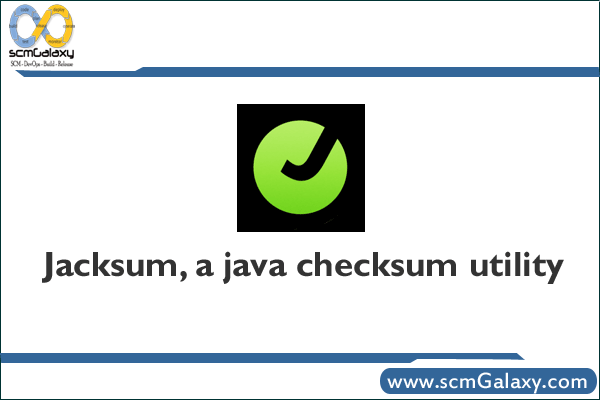

Jacksum, a java checksum utility
Software Name : Jacksum
Website : http://jacksum.net/en/index.html
Version : 1.7.0
Jacksum is a platform independent checksum utility (written entirely in Java) for computing and verifying (integrity check) checksums, CRC and hashes (fingerprints). It supports 58 popular hash algorithms and a lot of unique features.
The Jacksum is a freeware tool and suitable for more advanced users verify checksum values. It is platform independent software (support Windows and Unix) and supports 58 popular standard algorithms (Adler32, BSD sum, Bzip2’s CRC-32, POSIX cksum, CRC-8, CRC-16, CRC-24, CRC-32 (FCS-32), CRC-64, ELF-32, eMule/eDonkey, FCS-16, GOST R 34.11-94, HAS-160, HAVAL (3/4/5 passes, 128/160/192/224/256 bits), MD2, MD4, MD5, MPEG-2’s CRC-32, RIPEMD-128, RIPEMD-160, RIPEMD-256, RIPEMD-320, SHA-0, SHA-1, SHA-224, SHA-256, SHA-384, SHA-512, Tiger-128, Tiger-160, Tiger, Tiger2, Tiger Tree Hash, Tiger2 Tree Hash, Unix System V sum, sum8, sum16, sum24, sum32, Whirlpool-0, Whirlpool-1, Whirlpool and xor8).
The Jacksum is written in Java and open source, we can download the source code and try to understand how Jacksum implement the above algorithm.
Use of Jacksum
- Often time, while we downloading files or software via some secure website, “Checksum” values in MD5 or SHA1 format are provided to protect users from downloading corrupted files or trojan infected files. Unfortunately, many users has no idea how to verify the downloaded file with “Checksum” value, end up in downloading virus or trojan infected files.
- With Jacksum you can check if a filetransfer was successful. If you download software or huge files, like CD-images (so called iso files) from the internet, often there is a checksum or a hashcode provided. With Jacksum you can calculate such a checksum or hashcode from your local copy. If both checksequences are identical you know that the filetransfer was successful.
- As Jacksum supports recursively file processing, you can compare two directory trees. Therefore you will be able to verify, if your copies or backups are identical with the original source, even if you don’t have access to both trees at the same time (compare two DVDs with just one drive for example).
- Jacksum can assist you if you want to perform an unidirectional sync of two directory trees, even if they are on two different computer without a connection in between.
As Jacksum reads each byte of a file, you can check if all files are still readable on your CD-ROM or DVD. - As Jacksum supports a platform independent and compatible file format, it helps you to verify data integrity of burned data on CD-ROMs or DVDs even after many years and even if you will have changed your Operating System.
- Jacksum can help you to create incremental backups. If you are a developer, Jacksum can help you to create patches for your customers.
- You can use Jacksum for intrusion detection, because Jacksum can check whether and what files have been changed or deleted on your system. Jacksum can not only check the content of each file you want, but also the file timestamps.
- Use Jacksum for website content change detection, so get informed if something has changed on your favorite website (can be useful if the website has no announcement-mail-alias).
- This software is OSI Certified Open Source software
- It is entirely free software (it runs on free platforms and therefore it is listed also at the Free
- Software Foundation directory)
- It is free of charge, it costs nothing
- It is free of registration (well, I’m happy if you write an e-mail to jonelo@jonelo.de for feedback
- It never expires
Requirements:· JRE version 1.3.1 or later
Links:
http://manpages.ubuntu.com/manpages/jaunty/man1/jacksum.1.html
http://linux.softpedia.com/get/Utilities/Jacksum-7175.shtml
http://packages.ubuntu.com/lucid/jacksum
https://jacksum.dev.java.net/
http://www.jonelo.de/java/jacksum/
http://sourceforge.net/projects/jacksum/
I’m a DevOps/SRE/DevSecOps/Cloud Expert passionate about sharing knowledge and experiences. I am working at Cotocus. I blog tech insights at DevOps School, travel stories at Holiday Landmark, stock market tips at Stocks Mantra, health and fitness guidance at My Medic Plus, product reviews at I reviewed , and SEO strategies at Wizbrand.
Please find my social handles as below;
Rajesh Kumar Personal Website
Rajesh Kumar at YOUTUBE
Rajesh Kumar at INSTAGRAM
Rajesh Kumar at X
Rajesh Kumar at FACEBOOK
Rajesh Kumar at LINKEDIN
Rajesh Kumar at PINTEREST
Rajesh Kumar at QUORA
Rajesh Kumar at WIZBRAND

 Starting: 1st of Every Month
Starting: 1st of Every Month  +91 8409492687
+91 8409492687  Contact@DevOpsSchool.com
Contact@DevOpsSchool.com
